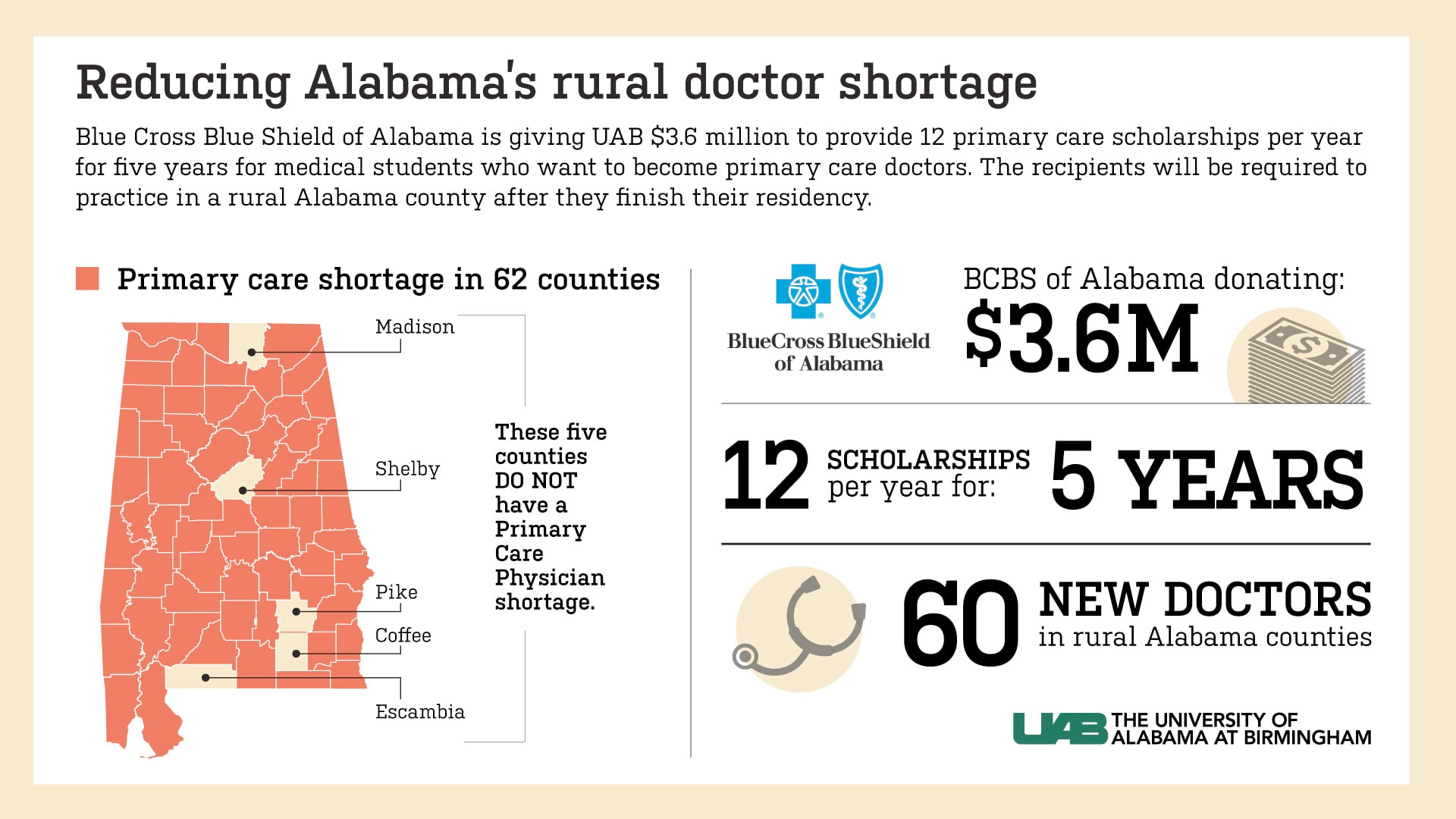 The majority of Alabama’s counties do not have enough primary care physicians to meet the needs of their residents. According to the Alabama Department of Public Health, under the federal definition of Health Professional Shortage Areas, 62 out of Alabama’s 67 counties are considered as having a primary care shortage. To help tackle the issue, the School of Medicine at the University of Alabama at Birmingham and Blue Cross Blue Shield of Alabama have created a program to increase the number of doctors practicing in rural parts of the state.
The majority of Alabama’s counties do not have enough primary care physicians to meet the needs of their residents. According to the Alabama Department of Public Health, under the federal definition of Health Professional Shortage Areas, 62 out of Alabama’s 67 counties are considered as having a primary care shortage. To help tackle the issue, the School of Medicine at the University of Alabama at Birmingham and Blue Cross Blue Shield of Alabama have created a program to increase the number of doctors practicing in rural parts of the state.
Blue Cross has given UAB $3.6 million to train a total of 60 primary care physicians over five years. The physicians will then return to practice in a county with a primary care shortage after they complete their residencies. The scholarship will pay the tuition of 12 third- and fourth-year students each year.
“As part of UAB’s mission, we not only provide quality and compassionate patient care here in the Birmingham region but also work towards greater access to such care statewide,” said UAB President Ray Watts, M.D. “We are grateful for the generous support and partnership of Blue Cross Blue Shield in this vital scholarship program that will help us grow the ranks of primary care physicians in rural areas of our state. The funding of these scholarships over the next five years will have a tremendous, long-term impact on health and quality of life throughout Alabama.”
“Every Alabamian should have access to high-quality primary care. Partnering with UAB will provide primary care services to more Alabamians in rural areas,” said Tim Vines, president and CEO, Blue Cross and Blue Shield of Alabama. “Recent studies show having access to primary health care results in improved health outcomes and lower health care spending. This investment validates our long-term commitment to providing Alabamians access to the quality health care they need.”
The recipients of the scholarship will be required to practice in the counties where they are placed for three years after their residencies, with the hope that they will remain in the counties after the end of their commitment.
“As someone originally from the small town of Demopolis in Marengo County, I’m especially excited that our expertly trained physicians will soon be serving in communities that need them so desperately,” said Selwyn Vickers, M.D., senior vice president for Medicine and dean of the UAB School of Medicine. “The students in this program will be the ‘boots on the ground’ out in the communities where individuals need advocates and knowledgeable medical professionals right now.”
The limited number of health care providers in rural parts of the state has resulted in poor health outcomes that are not currently improving with the current number of physicians. According to William Curry, M.D., senior vice president for Population Health for UAB Health System and the associate dean of Rural and Primary Care, the lack of access to health care impacts residents, but also hurts Alabama’s workforce and limits the state’s ability to attract new businesses and industries.
“Placing an additional 60 primary care physicians in areas with shortages will diminish health disparities,” Curry said. “It will lessen the burden of disease and reduce the number of preventable deaths in our state.”
The School of Medicine also operates two other educational programs designed to recruit and train primary care physicians specifically for future rural Alabama practice. The Rural Medical Scholars Program is a joint program of the School of Medicine and the University of Alabama’s College of Community Health Sciences, which serves as the Tuscaloosa Regional Campus of the School of Medicine. The Rural Medicine Program is conducted by the Huntsville Regional Campus of the School of Medicine and the College of Sciences and Mathematics at Auburn University.
The first scholarship recipients will be selected this summer.